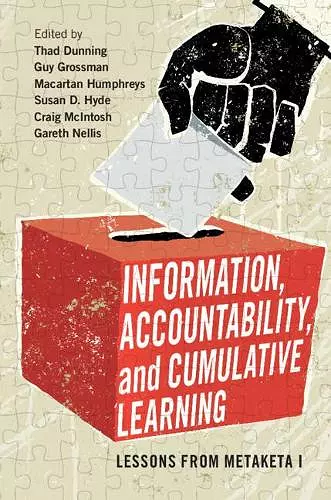Information, Accountability, and Cumulative Learning
Lessons from Metaketa I
Susan D Hyde editor Thad Dunning editor Guy Grossman editor Macartan Humphreys editor Craig McIntosh editor Gareth Nellis editor
Format:Paperback
Publisher:Cambridge University Press
Published:11th Jul '19
Currently unavailable, and unfortunately no date known when it will be back
This paperback is available in another edition too:
- Hardback£95.00(9781108422284)

Examines a set of voter information campaigns worldwide to assess their effectiveness, and develops a new social science research model aimed at cumulative learning.
Throughout the world, voters lack access to information about politicians, government performance, and public services. Efforts to remedy these informational deficits are numerous. Yet do informational campaigns influence voter behavior and increase democratic accountability? Through the first project of the Metaketa Initiative, sponsored by the Evidence in Governance and Politics (EGAP) research network, this book aims to address this substantive question and at the same time introduce a new model for cumulative learning that increases coordination among otherwise independent researcher teams. It presents the overall results (using meta-analysis) from six independently conducted but coordinated field experimental studies, the results from each individual study, and the findings from a related evaluation of whether practitioners utilize this information as expected. It also discusses lessons learned from EGAP's efforts to coordinate field experiments, increase replication of theoretically important studies across contexts, and increase the external validity of field experimental research.
'This pathbreaking and hugely important book presents and, in a series of illuminating empirical chapters, applies a new method for organizing field experimental research to increase the likelihood of knowledge accumulation from multiple studies. In doing so, it offers the most thoughtful and effective response to date to the challenge of cumulative learning in the field-based social sciences.' Daniel N. Posner, James S. Coleman Professor of International Development, University of California, Los Angeles
'The Metaketa Initiative represents some of the best of what social science has to offer: rigorous research informed by deep contextual knowledge, focused on urgent questions about how democratic institutions work - and could work better. By employing the highest standards of research transparency and coordinating research across countries, researchers participating in the Metaketa Initiative also directly confronted core methodologic challenges in ways that break new ground. This book is a tremendous contribution to our common search for new and meaningful knowledge in the field of global development and governance.' Ruth Levine, Director, Global Development and Population Program, The William and Flora Hewlett Foundation
'This book offers more than a multi-site investigation of governance problems in the developing world. It represents a new model of research collaboration and transparency. Many social scientists adduce evidence selectively in an effort to tell an intriguing theoretical story. The authors of this book put spin aside and guide us through the entire process from theoretical inspiration to site selection to data collection. Their analysis of six parallel experiments is guided by plans set out before the results became known, which makes the findings especially convincing. This book will be remembered not simply as a piece of outstanding original scholarship, but as a milestone in the credibility revolution that is unfolding in the social sciences.' Donald P. Green, Burgess Professor of Political Science, Columbia University, New York
'This is a path-breaking book on multiple levels. It makes a major contribution to our understanding of how ineffective it is to provide voters information and expect improvements in political accountability to result. It also offers a new way to undertake social scientific research that promises greater generalizability of results. Overall, this is one of the most important instances of a multi-project collaborative research initiative in the social sciences to have been conducted in decades.' Miriam Golden, University of California, Los Angeles
'By coordinating multiple research teams working globally around a much-debated issue, the Metaketa project proves that the old internal validity versus external validity debate presents a false choice - and teaches us important lessons along the way. This ambitious book sets a new standard for research rigor, and in my view it belongs on the shelf of every social scientist.' Edward Andrew Miguel, Oxfam Professor in Environmental and Resource Economics, and Faculty Director of the Center for Effective Global Action (CEGA), University of California, Berkeley
'Though social science aspires to the production of generalizable insights, all of the incentives drive scholars toward project differentiation rather than knowledge cumulation. In this important book, Dunning and co-authors illuminate a different path. They introduce a major methodological innovation, the metaketa, and apply it to one of the oldest questions in political science: the relationship between transparency and accountability. The book demonstrates powerfully how creativity and cumulation can coexist, and offers essential insights into how we can learn best from carefully designed research conducted across different contexts. A must-read for social scientists!' Jeremy Weinstein, Senior Fellow at the Freeman Spogli Institute for International Studies, Stanford University
ISBN: 9781108435048
Dimensions: 228mm x 153mm x 24mm
Weight: 810g
504 pages